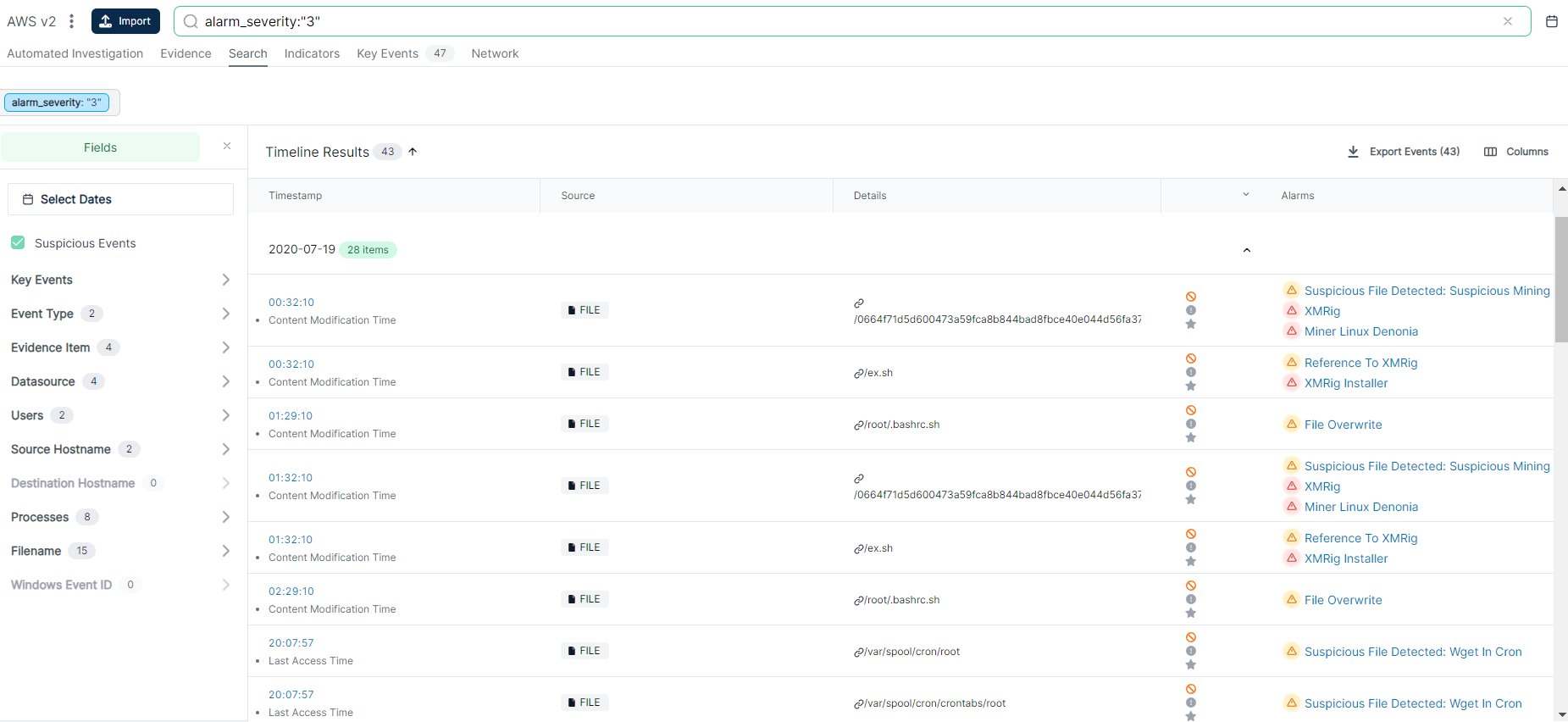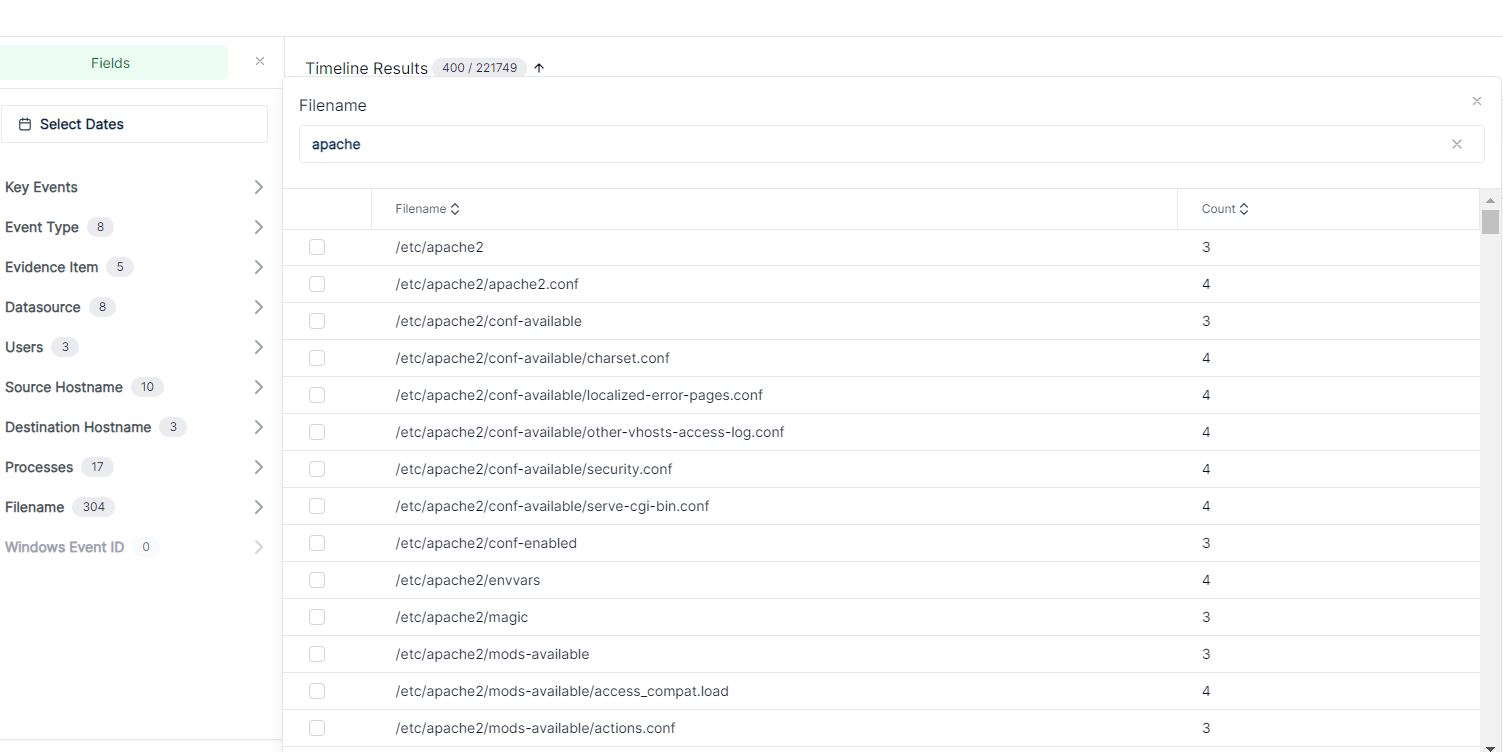What is the Timeline Tab?
The Timeline tab in the / Forensic Acquisition and Investigation platform provides an advanced search interface that supports complex queries to help you filter and analyze investigation data efficiently.
Faceted Search
/ Forensic Acquisition and Investigation enables you to filter search results using facets, such as event severity, associated usernames, files, or source/destination IP addresses.

For long lists of facets, you can easily search and sort through them.

Basic Searches
You can also use the search bar to perform specific queries using search strings.
Plain Search Terms
A plain search term will search across all fields. For example: foo
If the term contains spaces, enclose it in quotes: "foo bar"
Field-Specific Searches
To search within a specific field, prepend the field name to the search term. For example:
user: Chrisextra: "foo bar"
Ranges
You can search for a range of values within a field. For example:
file_size: [1024 TO 8196]
Building Complex Queries
You can combine search terms using AND, OR, and NOT, and use parentheses to group them:
Example:
alarm_severity: [0 TO 5] AND (user: "Chris" OR user: "James") AND NOT filename: "/foo/bar.txt"
Without parentheses, AND operations are evaluated before OR. For example:
user: "Chris" AND user: "James" OR filename: "/foo/bar.txt"
is treated as:
(user: "Chris" AND user: "James") OR filename: "/foo/bar.txt"
Searchable Fields
The following fields are searchable:
| Field | Type | Description |
|---|---|---|
macb | keyword | A 4-character string encoding MACB information (e.g., M..B for Modified and Birth events). |
source | keyword | The type of file or data producing this event (e.g., EVT, CLOUDTRAIL, FILE). |
sourcetype | keyword | More specific subtype of source. |
type | keyword | A ; separated list of event types (e.g., Last Executed Time, Updated Time, Creation Time). |
user | keyword | The user associated with the event. |
host | keyword | The hostname linked to the event. |
filename | special | The path of the file related to the event. |
full_filename | keyword | The full path of the file, supports regex and must match the entire path. |
inode | keyword | The inode number of the file. |
source_hostname | keyword | The source hostname for network connections. |
destination_hostname | keyword | The destination hostname for network connections. |
tag | keyword | Tag representing the event type (e.g., Network Logon, File Access, Execution). |
executed_process | keyword | The path of an executed file, if detected. |
short | text | Short text providing additional event details. |
extra | text | Additional data from the raw event, longer than short. |
alarm_severity | int | Severity of the event (Malicious: 1, Suspicious: 3, Other: 10). |
isFolder | boolean | Whether the event is related to a folder. |
evidence_id | int | ID of the evidence item. |
timestamp | int | Unix timestamp of the event. |
file_size | int | The size of the file related to the event. |
sha256 | text | SHA-256 hash of the file related to the event. |
strings | text | Extracted strings from the file related to the event. |
is_starred | bool | Whether the event is starred. |
for_report | bool | Whether the event is included in a report. |
alarm_description | keyword | A short description explaining the reason for an alarm. |
alarm_attack | keyword | MITRE ATT&CK tactic or technique code. |
attribute_name | keyword | File attribute information (e.g., $STANDARD_INFORMATION, $FILENAME). |
Notes on Search Behavior:
- Fields of type
intorkeywordrequire exact matches. - Wildcard characters (
*for multiple,?for single) can be used inkeywordfields. - Fields of type
textsupport partial matches.
Example:
user: chrismatchesuserfield with valuechris.user: ch*matcheschrisor any string starting withch.user: chdoes not match as it requires a full or wildcard match.
Searching strings: content will return events with matching data, such as "This is some example content.".